A man is killed and sent C.O.D. to a Hollywood actress.
Rather than call the police, the actress calls her reporter friend to help her out.
The reporter investigates the case like he’s a detective.
He sneaks in houses searching for clues and finds jewels that can be used as evidence. The reporter then puts the diamonds in an ice cube tray to hide them from police.
As these events occurred in “The Corpse Came C.O.D.” (1947) starring George Brent and Joan Blondell, my dad turns to me and asks, “I hope you don’t do these things at work.”
Later when Brent gets in a fist fight with a bad guy my dad asks, “Is there anyone at the Star that would be able to do that?”
As a reporter who loves classic movies, I go out of my way to watch films where the hero plays a reporter.
However, if I researched my stories using the same methods that reporters used in films, I would most likely get fired.
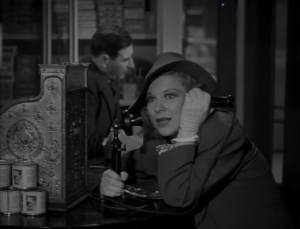
Glenda Farrell stars as Torchy Blane, a troublesome and wise-cracking reporter in 1930s films. Blane comically gets her information by hiding in trashcans and bugging rooms, techniques not used by contemporary reporters.
In classic films, reporters are often solving crimes like a police officer and often receive information by unethical means. At the Shelby Star, we do a lot of research on our stories, but I doubt we will ever solve a crime.
In the 1930s Torchy Blane film series, Torchy is constantly at odds with her detective boyfriend Steve McBride for being where she shouldn’t be.
The nine films follow the wise-cracking female reporter, played by Glenda Farrell, Lola Lane and Jane Wyman.
Torchy can be seen eavesdropping, bugging rooms, hiding in trash cans and following bad guys to get the scoop on a story.
If I hid in a trashcan to find out the latest secrets of Cleveland County, North Carolina, not only would that be breaking media laws, I would also smell pretty bad.
In “His Girl Friday” (1940), reporter Hildy Johnson, played by Rosalind Russell, hides an accused murdered in her rolltop desk to get the scoop on a story. Unfortunately, I don’t have a rolltop desk at work, but even if I did, I’m not sure how the sheriff would feel if I stored suspects in my desk.
In another George Brent film “You Can’t Escape Forever” (1942), managing editor, Brent will get hunches by tugging on his ear like he’s communicating with somebody via Morse code.
Then Brent will come up with a fantastic hunch that he will print in the paper, which usually ends up being true.
If reporters worked solely on hunches without fact checking, the paper would be full of corrections that had to be run, rather than news stories.
In “The Philadelphia Story” (1940) reporters James Stewart and Ruth Hussey pose as family friends at the wedding of Katharine Hepburn. The two are tabloid writers there to get information on the story.
Getting information under false pretenses is unethical by today’s standards and would most likely leave you with a lawsuit.
Though there are several comedic representations of newspapers, there are films that represent journalism in a truer light, such as “The Story of G.I. Joe” (1945) about war journalist Ernie Pyle or “Citizen Kane” (1940) about the power of journalism.
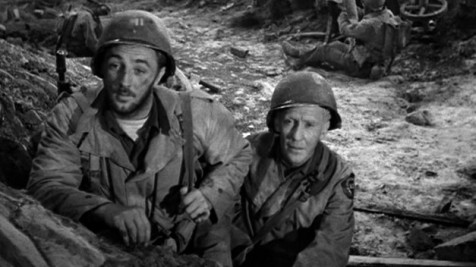
Robert Mitchum and Burgess Meredith (as Ernie Pyle) in World War II film “The Story of G.I. Joe” about reporting on the front lines.
As someone who works in newspapers, I don’t take offense to the unethical journalism in the 1930s and 1940s films, because I know most of it is there for comedic relief.
It doesn’t make me stop watching the films; you just have to take it all with a grain of salt, as you would with any movie.
Clearly newspapers have changed a great deal from the 1930s to today. However, it does make me wonder how media laws and ethics have changed in the past 75 years.
So for my father: No dad, we don’t do any of that at the Star.
This is part of the Breaking News: Journalism in Classic Films blogathon co-hosted by myself and Lindsay at Lindsay’s Movie Musings. Read all of the wonderful contributions here!
Check out the Comet Over Hollywood Facebook page, follow on Twitter at @HollywoodComet or e-mail at cometoverhollywood@gmail.com

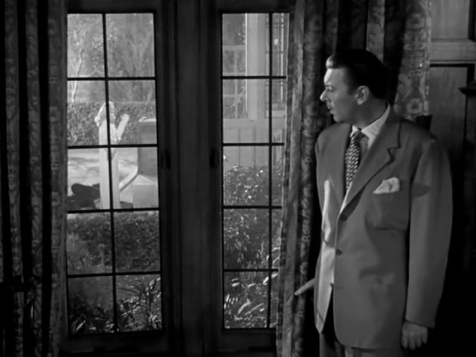
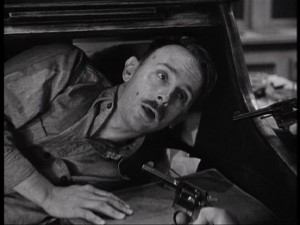
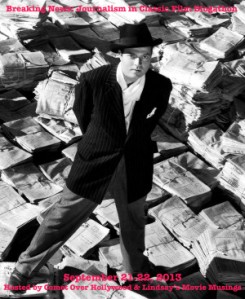
“However, if I researched my stories using the same methods that reporters used in films, I would most likely get fired.” I’m curious in what cases that ‘most likely’ wouldn’t qualify.
Like, would the Shelby Star give you the okay if you hid evidence that eventually allowed you to single handedly stop the bombing of the Panama Canal? Seems like you could get a regular editorial gig out of that.
LikeLike
Awesome post Jessica! I enjoyed it a lot!
LikeLike
Pingback: Breaking News Blogathon: Day 2 Roundup | Lindsay's Movie Musings
Jessica, I very much enjoyed your overview of journalism in the movies! You covered quite a bit of ground, from THE CORPSE CAME C.O.D. (which I recently saw on TCM and got a kick out of it) to Torchy, Rosalind Russell as Hildy in HIS GIRL FRIDAY, THE PHILADELPHIA STORY, and especially THE STORY OF G.I. JOE with Robert Mitchum and Burgess Meredith! Your dad’s comments had me smiling, too! Thanks for a swell post and the great work you and Lindsay’s awesome Journalism in Classic Film Blogathon!
LikeLike
What a great post! I love the fact that our Dads are featured in our blogs so frequently 🙂 I really enjoyed reading this and, at times, I actually pictured you hiding in a non-descript trash can 😛 Oh, I certainly giggled!
LikeLike
hahaha me hiding in a trash can is funny 🙂 I just hope I wouldn’t be stinky! Dads just can make movie watching so entertaining with their comments. I’m glad you enjoyed it and thanks for stopping by 🙂
LikeLike
I love the Torchy Blane films — I also like the Mr. Wong films with Boris Karloff, which feature the same kind of snappy female reporter who always uses sneaky techniques that infuriate the chief of police. Let’s face it, those kind of unethical reporting ideas may not be the way things ought to be, but they make great movies. Besides, we have plenty of those kinds in real life — paparrazi on bicycles running over celebrities on sidewalks, causing automobile accidents just to get pictures, lots of things like that going on now. I’m glad to know real newspapers like yours don’t stoop to such low yellow journalism, and I know many don’t, particularly the smaller publications. But in the old movies, boy they are fun! Nice article!
LikeLike
Thanks for stopping by, Becky!
I haven’t seen any of the Mr. Wong movies, but will have to check them out. I will admit, though I know everything they are doing is illegal, all of those films are so fun. And you are right, things like TMZ probably aren’t doing too much better than Torchy in a trash can
LikeLike
I am so relieved to learn that you are not following in the steps of those who bend the rules! Most of those movie-reporters are fun, but you also mention the serious issue of using the power of the press for the wrong reasons. Great post, Jessica. And thanks for hosting!
LikeLike
I’m gald you don’t do these crazynesses in your daily job, and your father’s comments were just hilarious. Reporters in film usually have a more thrilling life than they do in real life, solving crimes and looking for a big scoop. As I wrote in my review of Ace in the Hole, I believe ethics have changed few, and the war for audience sitll exists.
Thanks for hosting this wonderful blogathon!
LikeLike